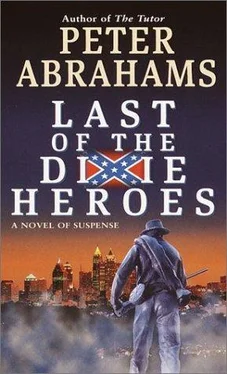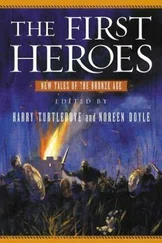Peter Abrahams - Last of the Dixie Heroes
Здесь есть возможность читать онлайн «Peter Abrahams - Last of the Dixie Heroes» весь текст электронной книги совершенно бесплатно (целиком полную версию без сокращений). В некоторых случаях можно слушать аудио, скачать через торрент в формате fb2 и присутствует краткое содержание. Жанр: Триллер, на английском языке. Описание произведения, (предисловие) а так же отзывы посетителей доступны на портале библиотеки ЛибКат.
- Название:Last of the Dixie Heroes
- Автор:
- Жанр:
- Год:неизвестен
- ISBN:нет данных
- Рейтинг книги:4 / 5. Голосов: 1
-
Избранное:Добавить в избранное
- Отзывы:
-
Ваша оценка:
- 80
- 1
- 2
- 3
- 4
- 5
Last of the Dixie Heroes: краткое содержание, описание и аннотация
Предлагаем к чтению аннотацию, описание, краткое содержание или предисловие (зависит от того, что написал сам автор книги «Last of the Dixie Heroes»). Если вы не нашли необходимую информацию о книге — напишите в комментариях, мы постараемся отыскать её.
Last of the Dixie Heroes — читать онлайн бесплатно полную книгу (весь текст) целиком
Ниже представлен текст книги, разбитый по страницам. Система сохранения места последней прочитанной страницы, позволяет с удобством читать онлайн бесплатно книгу «Last of the Dixie Heroes», без необходимости каждый раз заново искать на чём Вы остановились. Поставьте закладку, и сможете в любой момент перейти на страницу, на которой закончили чтение.
Интервал:
Закладка:
“When do we start?” he said.
“Start?” said Curtis.
“In Miami. When do we have to be there?”
“We?”
Roy got it. “You’re staying here?”
Curtis nodded.
“For that Eastern Europe thing.”
“That job’s gone.”
“Gone?”
“As part of the rightsizing.”
“What rightsizing?”
“That’s what this is all about, Roy. They even let Bill Pegram go this morning.”
Roy felt a tiny nauseous uprising deep in his throat. “That’s why you’re staying?”
Curtis’s eyelid fluttered.
“You got his job?”
Curtis’s eyelid fluttered again, almost stayed closed this time.
Roy held out his hand. “Congratulations.” Curtis’s handshake was strangely weak; he’d have to do something about that, up on seventeen. “So when do I go?”
“Go where, Roy?”
“Why, Miami, of course.”
“To do what?”
“My new job,” Roy said. “Regional supervising, area managing.” The titles made him laugh. “There’s still shipping, Curtis, like you said. What’s a global chemical company without shipping? There’s no virtual chemicals yet.” Roy surprised himself with that last observation; he got the feeling it might be the kind of remark that would land him on a seventeenth floor of his own someday.
“Almighty God, Roy. Don’t you see?”
“See what?”
“You’re not included.”
Roy started to have trouble connecting the words in his mind. “Meaning?”
“They let you go too.”
“Me?”
“I did everything I could. You’re the one I fought for.”
“I don’t understand.”
“How else can I put it?”
“Say it again.”
“They let you go.”
“Again.”
“Please, Roy.”
“Again.”
Curtis said it again.
No air. No air at all. Roy barely got a word out. “But what about the area supervision, the regional…”
Curtis shook his head. “Miami’s handling that. Cesar got the job.”
Roy’s hand was in his pocket, clutching the inhaler. It took a lot of strength not to pull it out.
“They did throw me one little bone,” Curtis said. “There’s an opening on the shipping floor up in New York. They said you could try for that.”
Roy had a vision of smashing the glass office to smithereens, but all he did was say, “Fuck New York,” and even that not forcefully, what with the lack of air.
“There’s nothing personal, Roy. It’s a business.”
But there had to be something personal, because Curtis couldn’t look him in the eye, couldn’t get his gaze any higher than the knot on Roy’s tie with the blue diamonds.
FOURTEEN
7:17. Roy drove out of the parking garage under the Globax building. The day was still young; a fresh springtime breeze was blowing the brassiness out of the sky, turning it blue. Carol and Jerry were talking about Jerry’s promotion, and how to apply the vision statement in his new job.
In your memo, you asked me to develop a new perspective, Carol. What did you mean by that?
Roy tore the tape out of the deck, rolled down the window, almost threw it out. But not quite. Throwing the tape away would be tantamount to… what? Roy didn’t know, didn’t even know exactly what tantamount meant, only knew that whatever the statement was, he didn’t want to make it.
But he wanted to do something. All that readiness inside him, all that eagerness, was still there. Not in its original form: what remained was the revved-up energy, like some animal force with the head cut off. What he wanted to do was make everything right immediately, to get to his desk, his new desk or his old desk, or some other one, to get back to work. How? His first thought was to turn around, to march up to the seventeenth floor, to say the right thing to the right person. But what was the right thing, who was the right person? He knew no one on the seventeenth floor, not even casually, now that Mr. Pegram was gone. And the decision hadn’t even come from the seventeenth floor; it had come from New York, from headquarters, about which Roy knew nothing.
Miami? Rightsizing? What did it mean? Did it have anything to do with the name change? What had DeLoach said the very day chemerica had come down and globax had gone up? Roy couldn’t remember. All he remembered was his own reply: it’s just a name change. He should have asked Curtis more questions. The reasons for what had happened were already slipping away from him, threatening to leave him stranded in some meaningless place. He couldn’t live like that, like one of those people with a “Shit Happens” bumper sticker, or their unknowing counterparts with the “Grace Happens” reply. Roy’s life had meaning, made sense. You worked all day, put good food on the table, sat down together, drank a little wine, the kid said something that made you smile at each other over his head, you relaxed, body and soul. That thought, coming back, made him squirm inside. Marcia was coming for dinner that night. He was going to tell her all about the promotion, the seventy-two seven, the bonus on top of that. Roy threw the tape out the window.
At that moment, the tape still in midair, he realized something important: under all this pressure, the worst pressure he had ever felt, he was thinking on a new level, deeper, smarter. Had his brain ever come up with connections like that shit-grace thing before? No. But now it was racing, and in this racing mode maybe reaching some potential that was always there. They were right to promote him. He could do the job.
Could have done the job. This firing had nothing to do with him. Maybe it made sense on one level-although Roy couldn’t see how anything that put all those men out of work and left a big empty space in the building could make sense-but it didn’t make sense in terms of him. He had the goods-some goods, at least-and someone somewhere would want him. He stopped at a red light, looked around, saw he was lost.
Not lost, because he’d lived in the city so long, but in the kind of neighborhood he normally would avoid, somewhere south of Abernathy. A big black guy came lurching toward him, the kind of black guy people would still be leery of if he were white, just not as much. Roy didn’t roll up the window: he hated the way car windows went up in this kind of situation.
“Lose somethin’, chief?” said the black guy, bending down, his face in the open window, a sweet alcohol smell already wafting in.
“No,” Roy said.
“Then what’s this?” said the black guy, holding up the tape.
“Nothing.”
“Don’t look like nothin’. Looks like music.” He tried to bring the label into focus with his red and blurry eyes, failed. “I’m guessin’ Perry Como, maybe, or Engelbert Humperdinck.”
“It’s not music.”
“Then what is it?”
“Advice.”
“Valuable advice?”
“I don’t know.”
The black guy stuck his head in, glanced around. “Don’t know what’s valuable?” he said.
“Everything has some value,” Roy said.
“Who tol’ you that, chief?”
“Listen to it,” Roy said. “You decide.”
“Sure will, on my shiny new sixty-three speaker Bose built-in system wit’ the woofer under the floor, you just give me a little help on the down payment.”
The light turned green. Roy had a few one-dollar bills in the ashtray, could have handed over one of those, but fell for another idea. He took out his wallet, found more ones, a five, and a ten. He gave the ten: a bet on the future.
“My lucky day,” said the black guy. “Runnin’ into Mr. Big at last.” He shambled away without another word. Roy went home to work on his resume. The leftover energy dissipated. He emptied the inhaler on the way.
Читать дальшеИнтервал:
Закладка:
Похожие книги на «Last of the Dixie Heroes»
Представляем Вашему вниманию похожие книги на «Last of the Dixie Heroes» списком для выбора. Мы отобрали схожую по названию и смыслу литературу в надежде предоставить читателям больше вариантов отыскать новые, интересные, ещё непрочитанные произведения.
Обсуждение, отзывы о книге «Last of the Dixie Heroes» и просто собственные мнения читателей. Оставьте ваши комментарии, напишите, что Вы думаете о произведении, его смысле или главных героях. Укажите что конкретно понравилось, а что нет, и почему Вы так считаете.












